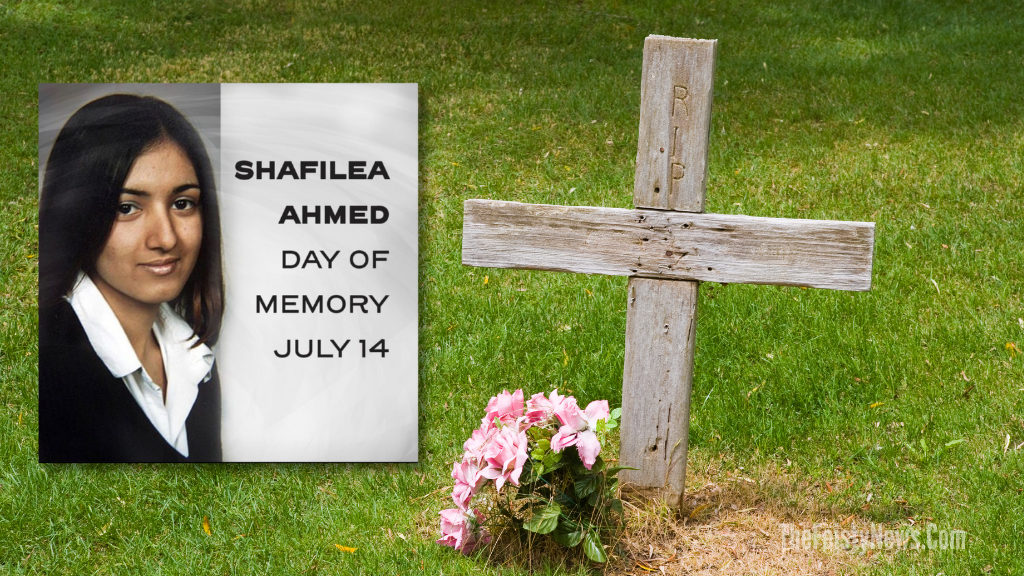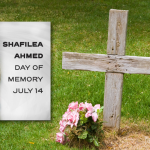Meet Shafilea Ahmed, a name that holds a story of courage and tragedy. She was a young British-Pakistani girl, born on a warm July day in 1986 in the vibrant city of Bradford, West Yorkshire. Friends and family affectionately called her “Shaf,” a fitting nickname for a spirited girl with dreams that stretched beyond the horizon.
Shafilea’s parents, like many immigrant families, came to the UK in search of a better life. They followed the Sunni branch of Islam and spoke Punjabi. Their roots traced back to the village of Uttam in the Gujrat District – a world away from the bustling streets of Warrington, Cheshire, where they decided to settle. It was in this town, amidst the blend of cultures, that Shafilea’s story unfolded. They wanted Shafilea to grow up following their cultural traditions, which sometimes led to misunderstandings and conflicts. But don’t we all have disagreements with our folks from time to time?
Shafilea’s Dreams and Struggles
Shafilea was no ordinary teenager; she was an A-level student with a heart set on becoming a solicitor, which is like a lawyer. She yearned for freedom, independence, and the chance to chase her dreams, dreams that sometimes clashed with the traditions of her family. But it wasn’t just about dreams; it was also about love. During a trip to Pakistan in 2003, Shafilea swallowed bleach in what many believed was a desperate act. Her parents explained it away as a simple mistake, claiming it happened during a power cut when she mistook the bleach for mouthwash. Prosecutors, however, saw through the facade, calling it “a stupid and obvious lie.” The incident left her with a damaged throat, requiring ongoing care. And it was during this trip that she turned down a suitor in a forced marriage, a suitor her parents insisted upon, but she refused.
Then came the day that changed everything. On September 11, 2003, Shafilea vanished. But it wasn’t until a week later that her teachers noticed her absence and reported it to the police. The community rallied behind the cause of finding Shafilea. Actress Shobna Gulati became the face of a media campaign, reciting some of Shafilea’s poems on television. It became a nationwide hunt, and as days turned into weeks, the worry intensified.
Shafilea’s disappearance without report, her damaged throat, and the pressure from her family sure painted a grim picture. Superintendent Geraint Jones told the Daily Mirror that her family had found a suitor for her in Pakistan but insisted that she was free to make her own decisions.
But what really happened to Shafilea?
The Discovery
Days turned into weeks, and the worry for Shafilea’s well-being only deepened. Her teachers, friends, and investigators joined forces to find any clue that could lead them to the missing young woman. The question on everyone’s mind was, “Where is Shafilea?”
Then, in February 2004, the search came to a chilling end. Her dismembered remains were discovered near the River Kent in Sedgwick, Cumbria, approximately 70 miles away from Warrington. It was a somber moment that sent shockwaves through the town and the entire nation.
Police quickly realized that her corpse had been intentionally hidden. Among the grim discoveries were a gold “zigzag” bracelet and a blue topaz ring, both of which her parents identified as belonging to Shafilea. The condition of her remains, however, presented a significant challenge.
Pathologist Alison Armer examined Shafilea’s remains, but due to the advanced state of decomposition, determining the cause of death proved to be an impossible task. The condition of the body left many questions unanswered, casting a shadow of uncertainty over the investigation. Detective Sergeant Mike Foster explained at a hearing, “The pathologist could not determine the cause of death, but did say the body was that of a young female. Obviously, because of the condition of the body, she was unable to give any further findings.”
With limited physical evidence to work with, investigators faced a formidable challenge. The truth about what had transpired on that fateful day was shrouded in mystery.
A Sister’s Revelation
As time passed and the investigation into Shafilea’s death continued, an unexpected turn of events unfolded. Alesha, Shafilea’s younger sister, was at the center of a shocking revelation. It was August 25, 2010, when Alesha became involved in a robbery at her parents’ house in Warrington. This incident was the catalyst for exposing the truth behind Shafilea’s mysterious disappearance.
Alesha, along with her siblings and parents, was present during the robbery. Law enforcement quickly became aware of her participation and arrested her. But it was what Alesha would reveal during the subsequent interrogation that sent shockwaves through the entire community.
Alesha disclosed a heartbreaking account of what had transpired on the day her beloved sister vanished. She described the relentless pressure placed upon Shafilea to accept an arranged marriage and the family’s mounting fear that her refusal would bring dishonor. Alesha’s testimony unveiled a chilling truth: her father, in an act of desperation, had placed a plastic bag in Shafilea’s mouth and suffocated her to death.
The motive for Shafilea’s murder became heartbreakingly clear. Her parents believed that her refusal to comply with the arranged marriage had cast a shadow over the family’s honor and reputation. In their eyes, the act of murder became a horrifying solution to prevent that perceived shame.
An honor killing is a violent act typically committed by a family member against another individual (often a female family member) who is perceived to have brought shame or dishonor to the family, community, or culture. These killings are rooted in a misguided sense of defending the family or community’s honor or reputation.
This revelation sent shockwaves throughout the community and the country. The question that had haunted everyone for so long—what had happened to Shafilea—was finally answered. Her sister’s brave testimony provided the key that unlocked the dark secrets hidden within the Ahmed family.
The Trial and Conviction
With Alesha’s shocking confession, the wheels of justice began to turn rapidly. In September 2011, Cheshire Police took a significant step forward by announcing that Shafilea’s parents, Iftikhar Ahmed and Farzana Ahmed, had been charged with her murder. The arrest marked the beginning of a legal battle that would shine a harsh light on the dark secrets hidden within the Ahmed family.
In May 2012, the trial of Iftikhar and Farzana Ahmed began. The courtroom became a stage for the drama that had unfolded within the family’s home. As the proceedings got underway, the details of Shafilea’s life, her dreams, and the harrowing circumstances that had led to her tragic end were laid bare for all to see.
The prosecution presented a compelling case that pointed to the motive behind the murder: the family’s perceived “dishonor” brought about by Shafilea’s refusal to accept an arranged marriage. The courtroom was filled with emotion as friends and family members recalled the young woman they had lost and the promising future that had been taken away from her.
On August 3, 2012, the trial reached its conclusion, and justice was served. Mr. Justice Roderick Evans, in delivering the verdict, stated, “An expectation that she lives in a sealed cultural environment separate from the culture of the country in which she lived was unrealistic, destructive, and cruel.” With those words, Iftikhar and Farzana Ahmed were both found guilty of murder and sentenced to life imprisonment with a minimum term of 25 years.





